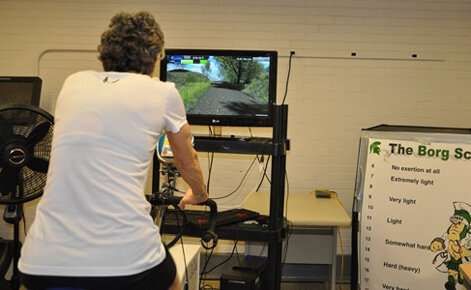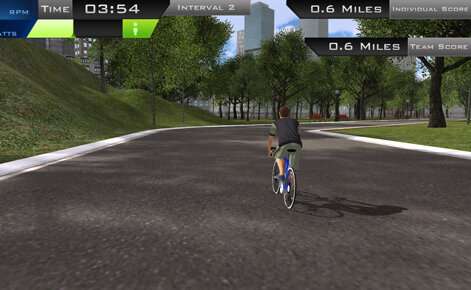How to get a better workout during a pandemic

How can we stay motivated to exercise while COVID-19 keeps us physically isolated from fitness centers, and each other?
New research from Michigan State University shows that working out with a stronger, computer-generated partner can help people ramp up their intensity, especially in the hardest parts of their routine.
The study, published in the Journal of Strength and Conditioning, was originally intended to determine how to maintain fitness levels for adults who spend very long time periods in isolation: astronauts.
"NASA is interested in finding ways to help astronauts stay motivated to exercise on long trips, especially if they go to Mars," said Deborah L. Feltz, lead author and MSU distinguished professor emerita of kinesiology. "We find that having someone—and it doesn't have to be a real someone—in front of you is encouraging, and can increase your efforts over time."
As a sport and exercise psychologist, Feltz has led previous research looking at how simulated exercise partners, or exergames, can motivate people to work harder than when they are exercising alone. This is the first study to examine the effect over a long time period and with high-intensity activity, which is required for anyone wishing to improve their fitness level.
In the NASA-funded study, 41 physically active middle-aged adults trained on a stationary bike in Feltz's laboratory six days a week for six months. Participants were assigned to either exercise by themselves or with a simulated partner whom they saw on screen in an exergame developed for the research by study co-author Brian Winn of the Games for Entertainment and Learning (GEL) Lab at MSU.

Researchers measured the intensity of participants' efforts and found that those who were teamed up with a partner programmed to always perform better than them continued to exercise harder over the course of the study. The effect was most significant in the last of four interval sessions, when participants were asked to ride at near-max capacity for four minutes per interval.
Eventually, the researchers hope to make the program commercially available.
The exercise regimen they followed, called SPRINT, was developed for NASA by Lori Ploutz-Snyder, co-author and dean of the University of Michigan School of Kinesiology.
Improving your exercise
But what does this mean for would-be exercisers stuck at home now? Online classes or services, such as Peloton, are likely to create similar motivating effects, but you don't need to spend money on such programs, Feltz said. Even the research participants with a lower performing partner or no partner at all worked out harder over time because they were motivated by the collaborative nature of the partnership (not wanting to let their teammate down) and the consistency of their daily exercise regimen.
"Find a structure, a program of some kind, and find a person who you can meet up with, virtually or in-person," Feltz said. "Ideally, that person is better than you, at running or whatever activity you choose, but it's also important that you feel like a team that supports one another."
More information: Deborah L. Feltz et al. Can Simulated Partners Boost Workout Effort in Long-Term Exercise?, Journal of Strength and Conditioning Research (2020). DOI: 10.1519/JSC.0000000000003732




















